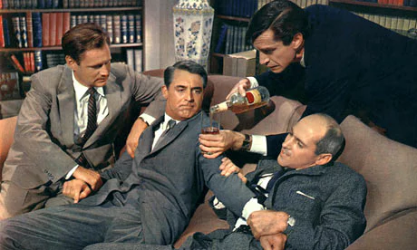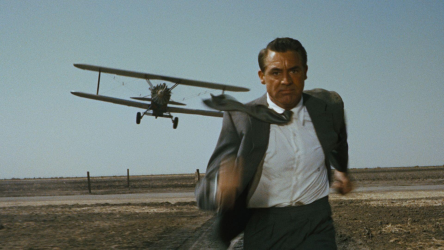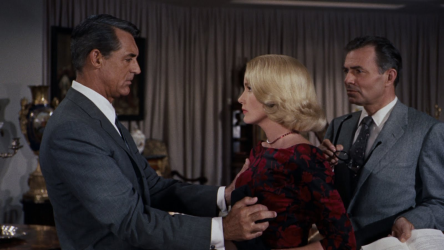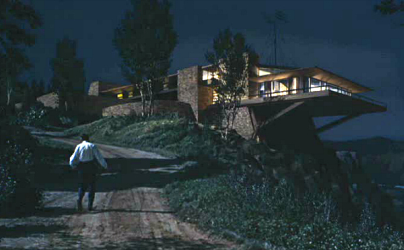It’s probably only interesting to me and a few other nerds that Alfred Hitchcock and Stanley Kubrick both have seven films in IMDB’s top 250. Of course, seven films represents over half of Kubrick’s output and only a little over 10% of Hitchcock’s, and there probably isn’t another director that has had a run like Hitch’s from the late ’40s to the early ’60s (unless it’s Alfred Hitchcock from the late ’30s to the late ’40s). And North By Northwest is considered in his top 5 films along with Psycho (1960), Vertigo (1958), Rear Window (1954) and Dial “M” for Murder (1954). I’m pretty sure nobody else has made two top 250 films in the same year .

No matter how much they had to drink.
The funny thing, though, about rewatching this film is that I was a little underwhelmed. And I think The Boy was, too. The Flower and The Boy’s Girl loved it, but this is where being a cinephile can have its downside. We (the Boy and I) both noticed the sparing use of music, and in places where music would’ve definitely improved things, like the cropduster sequence. The lack of music is positively odd there.
My theory on this, for a long time now, is that Hitch simply resented the brilliant musicians he worked with because they were geniuses who were not him. I don’t find this as sinister as my college music-for-TV-and-film prof (David Raksin) did. (Oh, he could rant about that “fat, old man”, he could, and understandably.) But Hitch was a guy (like Kubrick) who wanted to control every aspect of his film. He did not view filmmaking as a “team effort” even though it most certainly must be. I’ve heard it said that he made Psycho to prove he could make a movie without a story and The Birds to prove he could make one without acting (though I’m not sure either charge is justified).

I always felt like Grant’s straight line running would be especially ineffective as a defense against a biplane attack.
Anyway. It’s still a great movie. A momentary misunderstanding leads to Cary Grant’s Roger Thornhill being mistaken for a mysterious spy and abducted by evildoers working for James Mason and Martin Landau (in one of the great “heavy” roles), and the subsequent insanity requires him to flee in search of the real man he’s been mistaken for. On his journey he crosses paths with Eva Marie Saint (On The Waterfront) who just throws herself at him in one of the great screen romances.
I swear to God, every time I see this film, I have the same reaction. “Holy cow, Eve is throwing herself at him.” She doesn’t just flirt aggressively, but virtually challenges him to bed her down right then with the cops breathing down their necks. And then I think, “Well, he’s Cary Grant. That’s probably how it would go down.” And then she gets even more aggressive. And then I remember (after the film reminds me) that this is all part of the plot, a la Notorious. Nothing in this movie is an accident or just sloppy, of course.

Though I don’t recall this groping scene.
The other thing that gets me, every time, is the ending. I forget which filmmaker was talking about this, but he worked with Roger Corman, and he wanted to have a bit of exposition at the end of his film, to which The Corman said, “Monster’s dead. Movie’s over.” Hitch was the king of MDMO: In this film there aren’t thirty seconds between Eve slipping from Roger’s fingers to the train dalliance that the film ends on. It’s astounding. Dial “M” for Murder is another one like that:
“Take him away!”
(combs mustache)
The End.
Psycho is the exception and its lengthy post-Mother-mortem is a little hard to watch these days when of course we all know what psychotic mother-phobic slasher killers have going on in their crazy noggins.
At two-hours-and-fifteen minutes, this film still flies and is still fun with all its twist-and-turns. I’m just not sure if I’d rank it as highly today as I would’ve when I first saw it, or if it was just a mood thing. I could certainly watch it again, however, which probably tells you all you need to know.

Sadly, there’s no actual house atop of Mount Rushmore. I feel like Donald Trump would live there, if there were.

“Sadly, there’s no actual house atop of Mount Rushmore…”
But there’s one inside.
As you say, great movie. I watch it once every year and it never disappoints. Personally, I found the lack of music during the crop duster scene tended to enhance the feeling of isolation and suspense. It’s not like Bernard Hermann’s music wasn’t all over every other scene.
I think the lack of music works in the crop duster scene; The silence that surely exists at that intersection in the middle of nowhere.
All right, we got two votes for “no music in cropduster scene”.
Tragically, THIS IS NOT A DEMOCRACY! =P
Seriously, I might watch this again today and agree with y’all.